Two years before the eruption of the Syrian revolution, the child Tasnim Ali Basha was born in the city of Aleppo. Her parents are originally from the city of Binnish in Idlib countryside. In the second year of the revolution, when Tasnim was 4 years old, the Syrian regime’s storming of al-Ashrafia neighborhood, where she lived with her parents and two brothers Khadija and Ahmed, led to their displacement to Binnish.
After the first displacement of the child, an airstrike targeted the popular market in the city, and a fragment of the explosive missile hit her father, who was present in the market at the moment of execution and killed him.
Since 2011, about four million Syrian children have been born. They knew nothing but violence, displacement, broken family ties, and lack of access to vital services, without any experience of peace and security, in addition to the low level of their education if they ever obtained it.

Al-Tal camp in the town of Dabiq, which was built after the recent waves of displacement from the countryside of Idlib and Aleppo – February 2020 (Enab Baladi)
Different lives in almost the same geography
How do children live in Syria?
The death of the father was the first and “greatest” loss in Ali Basha’s life and her two brothers’ since the beginning of the revolution, and the second loss was the feeling of “safety,” says Ali Basha’s mother.
The losses did not prevent Ali Basha from starting her primary school in 2016 at the “Sons of Martyrs” school in Binnish, as her mother encouraged her to adhere to school and study. “Even in the most difficult circumstances,” Ali Basha excelled at school. She is now pursuing her studies despite repeated interruptions caused by the second displacement to the village of Juwainiya, which was in the period of opposition control of Idlib in March 2015, She could not have access to education because the third displacement to the city of Azaz in the northern countryside of Aleppo, after the recent military escalation of the Syrian regime, backed by Russian forces, on villages and towns of Idlib countryside in late 2019.
Tasnim returned to Binnish again and back to school after an interruption of about a month. Her mother feeds her with the idea of revolution. The child shows her persistence to fulfill her dream to become a genetic disease doctor, so she may find a way to help her brother, who has Down’s syndrome and genetic problems. While the regime’s warplanes are targeting schools in Idlib and its countryside, about 350 schools have stopped operating in conjunction with the regime’s control of different areas and the displacement of nearly one million people towards the north of Syria, shortly after the recent military campaign in northwestern Syria.
The United Nations Children’s Fund (UNICEF) estimates that the number of Syrian children out of school reached one million, and the number of unusable schools amounted to 40 percent of all schools.
The systematic targeting of educational facilities, the security situation, frequent displacement, and the lack of shelter due to the battles left a clear mark on the regress of the education sector in Idlib Governorate and its countryside.
In addition to the decline in the medical sector in the city, the “Syrian Response Coordinators Group” documented the targeting of 88 educational facilities, 32 health facilities, and the killing of 212 children in the northwestern regions of Syria, only between November 2019 and 6 March 2020.
The recent military operations in the region led to the displacement of about one million civilians from Idlib and Aleppo countryside, about 60% of them are children, 10% of these displaced people live in the wild and under trees, according to the statistics of the United Nations Office for the Coordination of Humanitarian Affairs, on 15 February.
29,257 boys and girls were killed by all the main actors and factions in Syria from March 2011 until March 2020, according to the documentation of the Syrian Network for Human Rights (SNHR).
According to a report issued by the Independent International Commission of Inquiry on the Syrian Arab Republic, at the beginning of this year, under the title “They erased my children’s dreams,” the various parties to the conflict offered intellectually competing curricula between them in schools in the areas under their control, which led to many parents to imprison their children at home or enroll them in temporary schools.
Allah, Syria and only Bashar
Lana, who was born in 2013, lives with her family in Aleppo, the city they never left during the war. She entered kindergarten at her regular age, got an education that her parents considered to be good, and say that she is doing well in her class, as she is seven years old today and is in the first grade of primary school.
Activities in the school are almost typical, compared to government schools, but the cost of the school reaches 500,000 Syrian Pounds annually with transportation costs in buses, clothes, and trips. This is what her parents, who are middle-income people, consider very expensive, but they do not intend to transfer her to the public school because its level “is declining. The stories we hear from these schools indicate a lack of attention to students, unlike before.”
In Lana’s classroom, there is a picture of Bashar al-Assad. She says to her parents that he is “our president” and repeats the same thing when she sees his photos on the street.
The child learned the slogan “Allah, Syria and only Bashar” by heart and repeated it in the occasions or celebrations of the school, according to her mother who does not mind that, as she fears that persuading the child not to repeat the slogan may endanger the security of her family.
Lana teaches her younger brother the same slogan, although their family did not support the regime, but “children spoil and do not understand the matter well; they may harm us if we violate the predetermined perspectives they learn in school,” says the mother.

Children playing on the ruins of Deir Amman in the western countryside of Aleppo – 19 January 2020 (Enab Baladi)
Kurdish Autonomous Administration areas for everyone
Ahmad, who was born in 2010, is in the second grade in the primary school “Al-Andalus,” located on the northern outskirts of Raqqa city. He studies in the school, besides the Arabic language, the Kurdish language “as Kurdish students study there too,” to please his parents who are working in one of the official departments of the Autonomous Administration for northern and eastern Syria.
Despite Ahmed’s parents descending from Arab tribes, they strive to teach their son and 16-year-old daughter the Kurdish language and participate in festivals such as “Nowruz” and the events, celebrations, and festivals held by the “Autonomous Administration.”
The father of the child, Ahmed, told Enab Baladi that he wants his children to learn the Kurdish language because he believes that this language will dominate the region, so his children will benefit from it in the future.
While the Kurdish language received approval from the parents of Ahmed and a segment of the residents of the areas controlled by the Autonomous Administration who re-learned their Kurdish language after an interruption, another portion of the population, whether belonging to the Kurdish component or other components in the region, denounces the Autonomous Administration’ imposition of the curricula in the Kurdish language on schools, and attributes their condemnation and rejection to the absence of official recognition of these curricula by any other body.
Illiteracy is high in the areas of Autonomous Administration, and thousands of students drop out of school, as their curricula are imposed by force. It is difficult to reach a few and overcrowded public schools.
The Autonomous Administration has resorted, since 2015, to introducing new curricula in the Kurdish language to the first primary grades, in its regions. It has also moved to gradually generalize the curricula at the various educational stages, as the academic year 2019-2020 witnessed the introduction of the curriculum of Autonomous Administration to the eleventh grade. In 2013, the Kurdish curriculum was applied from the first grade to the fifth grade, and in 2015 the curriculum was taught until the eighth grade and was imposed until the ninth grade in 2019.
Opinion poll: different points of views over the reference of education
According to an opinion poll Enab Baladi conducted on its Facebook page, in which about 400 users participated, the majority of respondents said that they raise their children by teaching them ideas and principles according to their convictions.
Fifty-seven percent of the respondents considered that they have the personal freedom to raise their children according to what they think is intellectually correct.
In contrast, 43 percent of the respondents considered that educating children under the principles of the ruling party of the area in which they reside is safer.
A climate fraught with hostility and a warning that crosses the conflict lines
How do educational curricula in Syria perpetuate “non-national” cultures?
The active armed parties in Syria, each according to the geographical area it controls, impose their orientations, which often serve the interests of their ideas. The focus of these parties is directed towards the educational sector concerned with education and socialization, and the introduction of political and intellectual principles in the school curricula, as education is an essential means to disseminate those principles for children. This confusion in the educational field contributes to empowering partisan, political, or national affiliation over the belonging to Syria as a country with a clear identity.
In the third year of the revolution, the formation of Autonomous Administration on the Syrian island was announced, and it imposed itself on society through its affiliated institutions, which took over the management of various sectors, including the education sector.
2014 witnessed the floundering of the educational process in the regime-controlled areas, and a collapse in the opposition-controlled areas, in conjunction with the formation of the “Interim Government” of the National Coalition for Syrian Revolution and Opposition Forces. The Ministry of Education also started working hard to move the education process in areas not controlled by the regime, by providing educational centers, adjusted curricula, and educational alternatives, according to available capabilities.
According to Syrian social researcher Safwan Moshili, this floundering in the different types of curricula with conflicting political references in Syria reflects a social and intellectual confusion in the future of Syria, which “threatens with a catastrophe that crosses the existing conflict lines.”
The Syrian people lived in a social and intellectual crisis before 2011. According to Moshili, the intellectual loyalties on which Syrians had been brought up in public schools had been mostly loyalties to the ruling Baath Party. Syria was thus officially, in the party’s and society’s culture, a “sector” divided from a broader nation that is the Arab nation, without focusing on a pure Syrian national culture.
In the present time, education in Syria has become worse, making the Syrian child live in an educational climate charged with political hostility that excludes the country as a concept from any school discussions the child learns. Students indeed are still “learning in an atmosphere that incites the sanctification of the individual ruler, being an inspirational figure that does not make mistakes” in the regime-controlled areas.
According to Moshili, the culture of education for the rest of the Syrian regions is not far from what is taught in the regime-controlled areas, but to sanctify other political ideas, which are often considered the opposite of the regime’s political beliefs. At the same time, Syria remains a national identity far from the minds of students.
Moshili does not consider that, after all this cultural divergence, children from these current educational climates in Syria have a completely different perception of political legitimacy or the concepts of justice, citizenship, freedom and rights, “which makes us far beyond claiming that we have accomplished a national culture that frame Syrians’ knowledge awareness.”
This will ultimately affect the way students communicate with each other intellectually and socially and will create inadequate awareness tools to ensure the cohesion of the Syrian identity, at the political level.
A “toxic psychological stress” experienced by a third of Syrian children
How do they dredge the misery of their reality towards their future?
Addressing the impact of conflict, hatred, and loss of parental care requires long-term dedication and synchronization in Syria according to international organizations involved in training children to psychologically adapt to long-term crises, according to Save the Children organization in a report in which it said that the nine years of war in Syria have left profound psychological effects in many children, and increased risk of suicide, heart diseases, depression and drug abuse in the long run.
According to what the organization documented in the report, a third of children who lost their homes or were bombed showed symptoms of severe emotional distress, which it described as “toxic psychological stress.” This group of children lacks the appropriate psychological support for their level of understanding of what is going on around them.
A child who could not adapt to armed crises around him resorted to drawing the attention of those around him. The drawing of attention could manifest into dangerous behavior such as suicide or drug addiction, as stated by the psychologist and educational specialist Asima Murshid to Enab Baladi. Therefore, the most important thing a child needs in case of losing his family in such cases is embracing and helping him to adapt to reality.
Murshid added that educating children gives them a space similar to their world, which takes them as far as possible away from the places of military danger in the areas they live in.
The disruption of education is a real problem, as there are 15-year-old teens who cannot read and write due to the targeting of schools by the Syrian regime forces. This has resulted in the gradual closure of these schools, reducing the available educational opportunities, and thus increasing the psychological disorders of children and their inability to cope with the lack of access to education.
In case of the presence of one or both parents, Murshid considered that they must provide emotional, psychological mechanisms that develop children’s ability to understand the events around them; that is, making sure that children understand their reality correctly.

Al-Tal refugee camp in Dabiq town, which was established after the recent waves of displacement from Idlib and Aleppo countrysides – February 2020 (Enab Baladi)
Mobilization of the present and denigration of future
With the spread of conflict ideas among children, influenced by their parents, siblings or friends, under the circumstances that they are enduring, the majority of them are teenagers who are conscripting or enlisting, to be engaged in violence because of economic instability or depression, after witnessing the violence committed by the warring parties against their beloved relatives.
According to the psychological specialist, the phenomenon of teenage recruitment in Syria portends negative feelings towards society. In adolescence, the child begins to build his own beliefs and ideas; besides, he is compassionate, and he seeks an ideal to follow.
All of this heralds the emergence of a criminal desire for recruited children in the future.
The mentor believes that, if the child manages to survive this possibility, he will live a severe intellectual and psychological conflict, due to the armed conflict in which he is now engaged. If he doesn’t find logical answers in his intellectual struggle in the future, hatred, fear, and rejection by society can be his destiny.
The future of children seeking safety
There are three possibilities for children’s personalities after crises and shocks, according to what the Syrian psychologist Mahmoud Othman said in an interview with Enab Baladi. When a person loses his flexibility and balance in dealing with life’s challenges and problems, the first possibility is suffering from mental to physical disorders within a process of reciprocal negative influence.
The second is related to a person’s ability to recover and restart his routine activities.
As for the third possibility, it is linked to personality development. A person acquires many positive characteristics that shape his personality and give him more control over his life to face challenges. This topic was the focus of many studies and researches related to the field of positive psychology under the name of “growth after trauma” or “growth after crises.” The specialist outlined the phenomena by the common saying, “what does not kill me, makes me stronger.”
Based on the foregoing, children currently living in Syria under different circumstances are exposed to a wide range of prospects within the other possibilities, which cannot be precisely predicted, as they will be subject to more extensive and broader frameworks.
A generation that can bear responsibility in the future
Even if the second and third categories of children are relatively few compared to the most affected and fragile groups, these members may be able to assume responsibility and show a sense of commitment to significant issues and humanitarian orientations, according to the psychologist Mahmoud Othman.
However, creating a Syrian generation that is psychologically, pedagogically, and behaviorally balanced requires long-term community efforts, especially given the low percentage of psychologists in Syria, according to the specialist in counseling and psychotherapy Kawther Saeed.
In an interview with Enab Baladi, Saeed claimed that the crisis of armed conflict experienced by children in Syria would reflect on them with negative feelings. She also stressed the importance of knowledge of dealing with these feelings by society and relevant international organizations.
Othman demonstrated many examples of countries that have lost wars and managed to make progress and recover in record times. The Japanese and German experiences are famous examples that stand for societies that operate to achieve remarkable improvement after the crisis. That was the result of relying on human resources, especially after losing its infrastructure. Japan, in particular, has built on creating a severe and responsible generation through curricula that have prioritized principles and values alongside modern science.
Future communication channels between the children of three regions
As for Mahmoud Othman, it’s undeniable that intellectual differences are a real dilemma, and they have caused many human conflicts since ancient times. These differences have been exploited throughout history to promote intolerance after paving the road and mobilization to spread hatred.
So, preparing the ground for coexistence and tolerance for the current emerging generation will be a real challenge for formal and informal institutions in these three regions.
Kawthar agreed with those points, by shedding light on the inability to create effective communication between the children of the three regions in Syria unless the war stops and the conflicting parties are removed.
Security is a prerequisite for restructuring the Syrian generation
Psychiatrist Kawthar Saeed arranged possible solutions for restructuring the Syrian generation despite its deep-rooted differences after the revolution entered its tenth year. These solutions focus on scientific priorities based on security, education, psychological support, and human development.
Saeed asserted that the present generation would not be brought under control unless the war stops. It is not feasible to solve this intellectual and educational divergence, which arose within the children and was cultivated in their minds. Mainly, it is challenging to educate them or provide psychological support amid insecurity.
Education, which is considered the pillar of the child’s personality, is built by giving him the necessary information and the chance to correct his mistakes, besides introducing personal and human development programs to educational approaches, so that the person can be an active member in the future.
International concerns about the children of the Syrian war years
On 27 February, Henrietta Fore, Executive Director of the United Nations Children’s Fund (UNICEF), spoke to the Security Council at the United Nations headquarters in New York about the situation of children in Syria, calling for the protection of their rights.
According to Fore’s description, about 280,000 children in northwestern Syria were “brutally” deprived of education.
About 180 schools are out of service for being destroyed, damaged, or used as shelters. The director considered this fact a violation of children’s hopes and future in Syria.
In her speech delivered in front of the Security Council, she called on all parties in all regions of Syria to protect children and the necessary civilian infrastructure such as schools, hospitals, and water networks, which they and their families rely on.
She immediately urged all member states to fulfill their obligations under the Convention on the Rights of the Child and return children to their homes in safe, voluntary, and dignified ways.
On 13 March, the President of the International Committee of the Red Cross, Peter Maurer, insisted that the psychological support can be offered through the rehabilitation of hospitals, schools, and public places, according to the official Syrian news agency (SANA), stressing the need to provide courses to deal with the psychological aspects.
According to the Executive Director of UNICEF, the living conditions of children, especially those who previously lived on lands controlled by ISIS, do not provide the necessary care and protection for every child.
Fore affirmed that family unity should be preserved in order to protect the best interests of the child because children must be reunited with their brothers, sisters, and their parents, and especially their mother.
For her, investing in the children of Syria is the best investment, and anyone can do it because it is an investment in the future and peace.
Yet, she concluded by saying: “We are missing this chance while turning another page of the annual calendar.”
if you think the article contain wrong information or you have additional details Send Correction
النسخة العربية من المقال
-
Follow us :
Most viewed
- Syrians pack their bags in Turkey
- After European call to engage with Syrian regime, Italy appoints ambassador to Damascus
- Syrian pressures prevent Omar al-Aroub from attending Paris Olympics
- Turkey and Russia discuss resuming patrols on M4 highway
- After Baraa Qaterji’s elimination, Is Syrian regime replacing its economic façade?


















 A
A
A
A
A
A


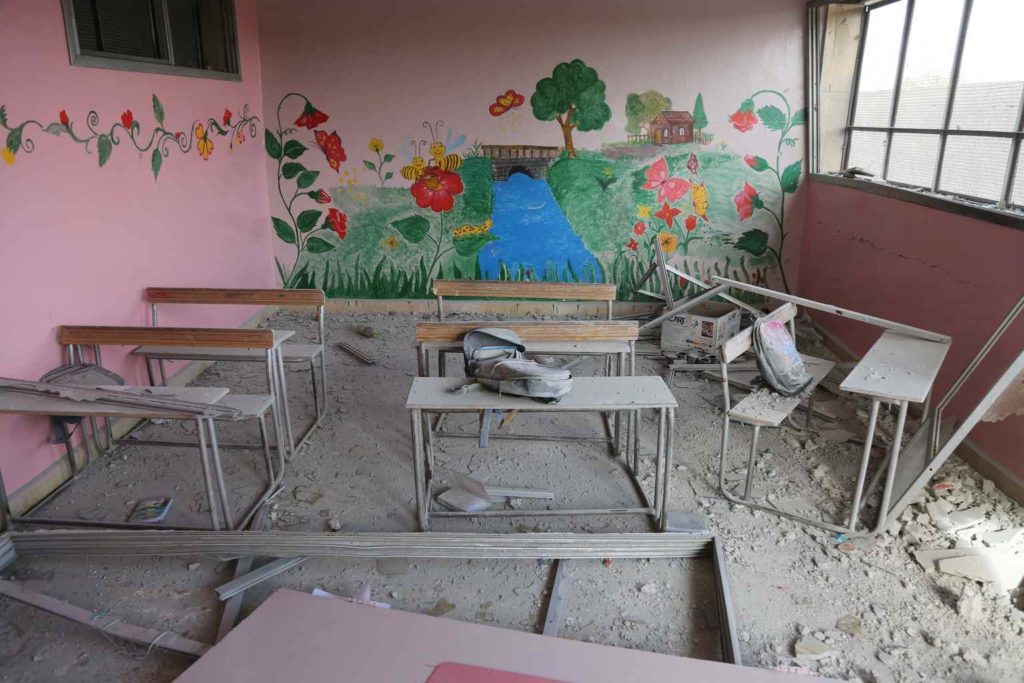
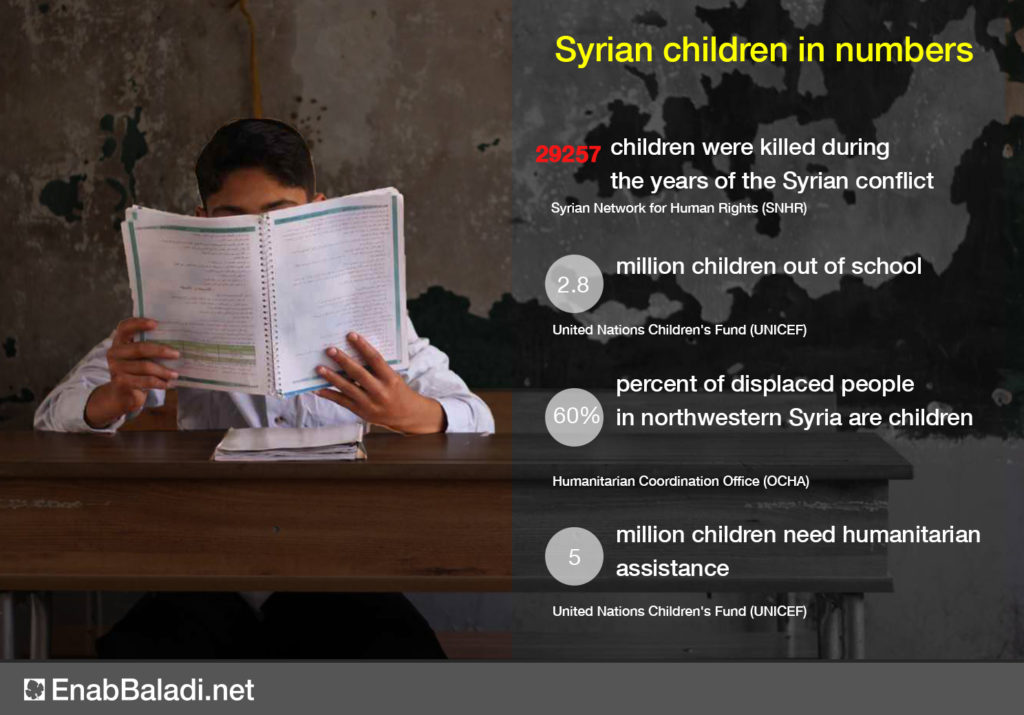
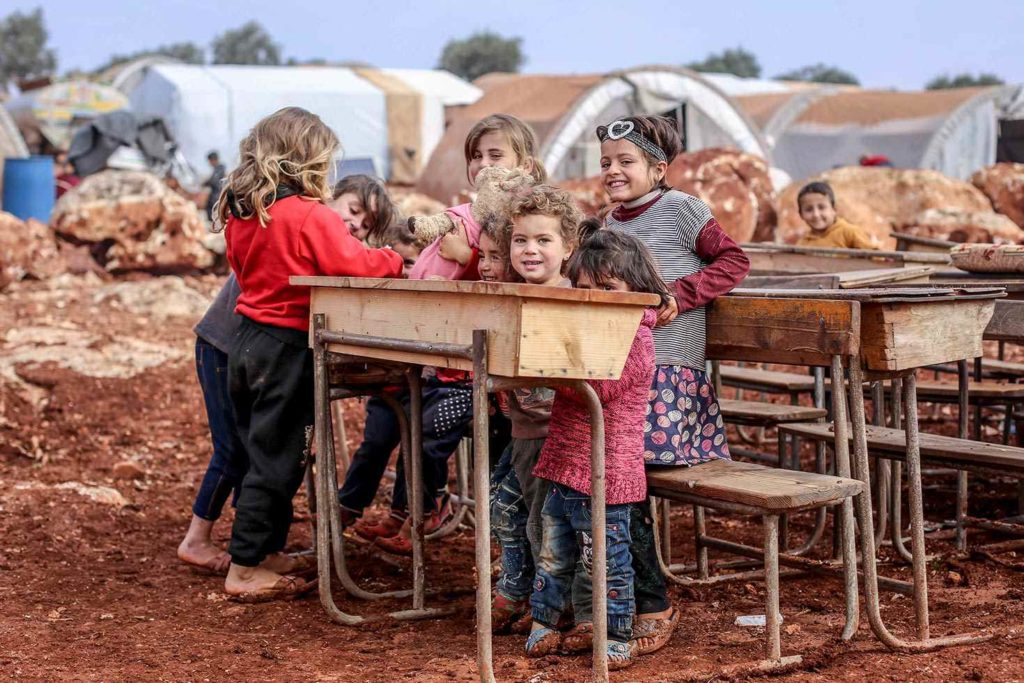


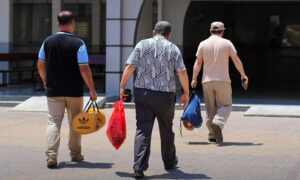
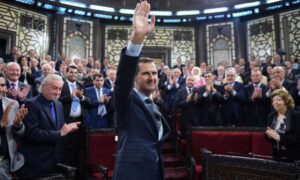
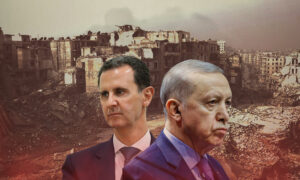
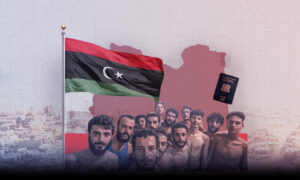
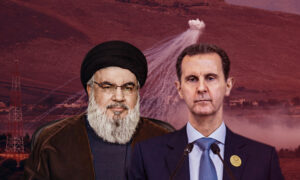
 More In-Depth
More In-Depth